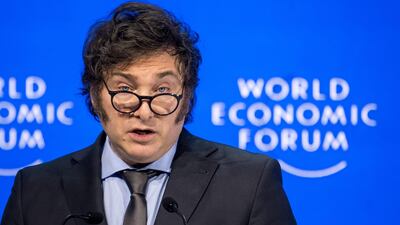One of the most talked about and shared videos from the 2024 World Economic Forum’s annual meeting in Davos was created using the US AI video platform HeyGen.
HeyGen harnesses the power of generative AI to streamline the video-creation process.
The speech, delivered by Argentina President Javier Milei, was already making headlines for his fiery delivery in which he attacked socialism, gender equality policies, collectivist economics and wealth redistribution, but an added technological twist is causing it to reverberate weeks after the meeting in Davos.
The new Argentinian president delivered his speech in Spanish, but a version of the speech translated to English through an AI video translation feature later stole the show.
Aaron Slodov, co-founder and chief executive of Atomic Industries, a creator of artificial intelligence-powered manufacturing solutions, posted a version of the speech on X using HeyGen’s AI translation.
This was no ordinary translation. Mr Milei’s mouth seemed to have a near-perfect match to the English audio. Users of X took notice and, 75 million views later, the world seemed to take notice. The speech also received almost 240,000 likes.
“Curiosity? Timing of the message/zeitgeist? A major theme in the comments was how amazing and terrifying it was simultaneously. Either way, it captures how powerful a good demo can be,” Mr Slodov later posted on X, reacting to the momentum of his initial post on the social media platform.
HeyGen, a Los Angeles-based start-up founded in 2020, used the continued momentum of the video to promote its AI-infused product.
“People hate watching non-lip-synced dubbed videos,” the company posted on X. “The original speaker’s voice is drowned out by the interpreter … the better the interpreter, the more you have to pay …”
The company is hardly alone in the increasingly crowded field of AI translation and video editing services.
In November, while announcing an AI advisory board, UN Secretary General Antonio Guterres spoke about major advances in AI video manipulation and translation services.
“Thanks to one AI app, I had the surreal experience of watching myself deliver a speech in flawless Chinese, despite the fact that I don’t speak Chinese," he said.
“The lip movement corresponded exactly to what I was saying,” he said, referring to the technological triumph and potentially deceptive dangers stemming from AI.
Reaction to Mr Milei’s AI-translated speech has been a mixture of astonishment and concern, a balance that continues to play out as AI evolves.
Robert Wahl, an associate professor of computer science at Concordia University Wisconsin, spoke about the mixed reactions to AI video manipulation, noting that he has seen it play out before with computer-generated imagery, or CGI, as it is commonly known.
“It’s all about balancing the fears with the actual things it can do,” he said, referring to CGI and AI.
The translation and audio dubbing process has long been problematic, with translation voices not matching mouth movements, thus making for a distracting movie-watching experience, according to Mr Wahl.
“Now with AI, you can level the playing field and maybe hit 10 different language translations and make it look flawless,” he said, explaining how filmmakers could make use of the tools, particularly those with limited budgets.
“It’s no longer just a specialised tool that’s in the hands of a certain number of people or large studios in Hollywood,” he added.
Mr Wahl acknowledged that ultimately, such tools could affect jobs in the traditional movie-making and translating apparatus, but said it might also have an upside.
“I agree with the predictions that ultimately there’s going to be a net improvement of production jobs because of AI, but there will definitely be a transition period where people need to learn new skills and adjust to keep up,” he said.
The viral clip of Mr Milei's speech is the latest in what has been a series of major moments showing promising and potentially problematic use examples of AI, inevitably prompting many to point out the potential for such technology to be abused.
Overall, however, Mr Wahl said he was hopeful that various attempts around the world to implement laws and standards around AI, will curtail major problems before they pop up.
"So the people who don’t have the right ethical background are going to misuse the technology. It’s going to happen," he said.
"But I think, in general, it’s going to be a good technology ... and speed things up."


